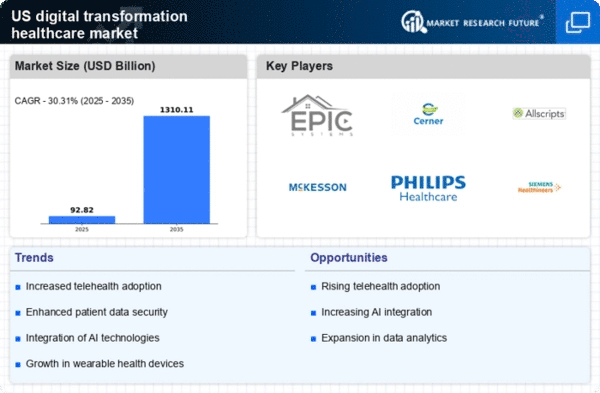Increased Demand for Remote Monitoring
The digital transformation-healthcare market is experiencing a surge in demand for remote monitoring solutions. This trend is driven by the need for continuous patient care and the ability to track health metrics in real-time. According to recent data, the remote patient monitoring market is projected to reach $2.4 billion by 2026, reflecting a compound annual growth rate (CAGR) of 25.5%. This growth is indicative of a broader shift towards patient-centric care models, where technology plays a crucial role in managing chronic conditions. As healthcare providers increasingly adopt these technologies, The digital transformation healthcare market is expected to expand, offering innovative solutions that enhance patient engagement and improve health outcomes.
Rising Healthcare Costs and Efficiency Needs
The escalating costs of healthcare in the US are prompting a shift towards digital solutions that enhance operational efficiency. The digital transformation-healthcare market is responding to this challenge by offering tools that streamline processes and reduce expenses. For instance, the implementation of electronic health records (EHR) has been shown to decrease administrative costs by up to 15%. As healthcare organizations seek to optimize their operations, the demand for digital solutions is expected to rise. This trend indicates a growing recognition of the potential for technology to not only improve patient care but also to address the financial pressures faced by healthcare providers.
Regulatory Support for Digital Health Solutions
Regulatory bodies in the US are increasingly supporting the adoption of digital health solutions, which is a key driver for the digital transformation-healthcare market. Initiatives such as the FDA's Digital Health Innovation Action Plan aim to streamline the approval process for digital health technologies. This regulatory support not only fosters innovation but also instills confidence among healthcare providers and patients. As a result, the market is expected to grow significantly, with estimates suggesting a potential increase of 20% in the adoption of digital health solutions over the next few years. This favorable regulatory environment is likely to accelerate the integration of technology into healthcare practices.
Consumer Demand for Enhanced Digital Experiences
Consumer expectations for enhanced digital experiences are reshaping the landscape of the digital transformation-healthcare market. Patients are increasingly seeking convenient access to healthcare services, including online appointment scheduling and telehealth consultations. A survey revealed that 70% of patients prefer digital interactions with their healthcare providers. This shift in consumer behavior is driving healthcare organizations to invest in digital solutions that improve patient engagement and satisfaction. As providers respond to these demands, the digital transformation-healthcare market is poised for growth, with innovations aimed at creating seamless and user-friendly experiences for patients.
Integration of Artificial Intelligence in Healthcare
The integration of artificial intelligence (AI) into healthcare practices is emerging as a pivotal driver in the digital transformation-healthcare market. AI technologies are being utilized for predictive analytics, personalized medicine, and operational efficiencies. Recent studies indicate that AI could potentially reduce healthcare costs by up to $150 billion annually by 2026. This capability to analyze vast amounts of data and provide actionable insights is transforming how healthcare providers make decisions. As AI continues to evolve, its role in enhancing patient care and operational efficiency is likely to expand, further propelling the growth of the digital transformation-healthcare market.
















